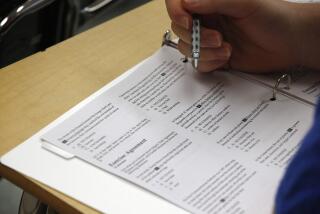No Language Barrier : College Board to Offer First Test of Proficiency in Chinese
- Share via
“It’s nice to know that Chinese is finally being accepted,” said Alhambra High School junior Gary Chen as he prepared to join more than 3,000 students nationwide on Tuesday in tackling the College Board’s first test to measure proficiency in Mandarin Chinese.
Chen, 16, a Chinese American, has studied Mandarin at his school for the past three years. He will be among about 250 students from the heavily Asian Alhambra, Mark Keppel and San Gabriel high schools who will take the Chinese exam.
The one-hour Mandarin test is only the second on an Asian language to make the College Board’s foreign language roster. Until last year, when Japanese was added, only French, Spanish, German, Italian, Latin and modern Hebrew had been offered.
L. Ling-chi Wang, a UC Berkeley professor and chairman of the UC Task Force on Asian Languages, says acceptance of the Mandarin test by the College Board is long overdue in view of the dramatic growth of the Asian American population and of U.S. interests with East Asian countries.
The number of students taking Mandarin, the language spoken by a fifth of the world’s people, increased by more than 50% between 1990 and 1993 in California’s public schools.
Tests are required for students seeking admission to many colleges. Although the University of California and other colleges require applicants to take English and math tests, students can choose their third exam, which can be in a foreign language. The achievement tests--known as SAT II--are used in making admission decisions and sometimes to place students in the correct course level.
The exclusion of Asian languages was ended in 1993 when the College Board, a consortium of schools and colleges formed in 1901 to offer college entrance exams, chose Japanese. The Japanese test was developed only after years of lobbying by the UC Task Force on Asian Languages and pressure from the California Legislature, according to Wang.
The big question now is whether to develop a test in Korean. People of Korean descent make up one of California’s largest Asian population groups after Filipinos, Chinese and Japanese.
*
College Board President Donald Stewart today will address a statewide conference on Asian languages in Pasadena and later will meet with Asian American scholars and Korean community leaders in Koreatown.
“We’ve invited him to Los Angeles so he can see for himself the size of the Korean American community,” said Edward Chang, a UC Riverside professor and a member of the UC task force.
Wang said there is a dispute over what was promised by the College Board.
“We had assumed all along that the agreement in 1991 was for four languages--Japanese, Chinese, Korean and Vietnamese,” Wang said.
But Brian O’Reilly, the board’s director of operations and development, said the only thing the College Board agreed to was “to take on the development of tests in appropriate Asian languages.”
O’Reilly acknowledged, however, that there is considerable interest around the country in including Korean. “We are working hard to come up with funding” to study the possibility of developing a Korean test, he said, but no timetable has been set.
As for Vietnamese, there has not been the same level of interest, he said.
O’Reilly said developing a Korean test would be “a complete departure” from the College Board’s policy because Korean is taught in only a few U.S. high schools.
But at a Koreatown news conference this week, Asian American educators said about 30,000 youngsters of Korean ancestry attend more than 1,000 community and church-related schools nationwide after school and on weekends because only four public schools in the country offer the language. The students should be able to pursue their interests, they said.
“Oftentimes the College Board . . . doesn’t understand the realities of the Asian American community,” Don Nakanishi, director of the UCLA Asian American Studies Center, told the news conference. “The College Board should get out of its East Coast perspective,” he added.
O’Reilly called Nakanishi’s remark unfair. “We have offices in San Jose,” he said. “It’s not fair any longer to say that we’re Eurocentric. We have two tests (in Asian languages).”
Alhambra High School sophomore Jennifer Sun, 16, who will be taking the Mandarin test, said she is thankful that “a lot of people worked hard” to make it possible for her to take the test.
“This is very exciting,” said Sally Chao, Alhambra High assistant principal. “When I was going to high school, I was envious of the kids who spoke Spanish and French and could take the test.”
More to Read
Sign up for Essential California
The most important California stories and recommendations in your inbox every morning.
You may occasionally receive promotional content from the Los Angeles Times.













